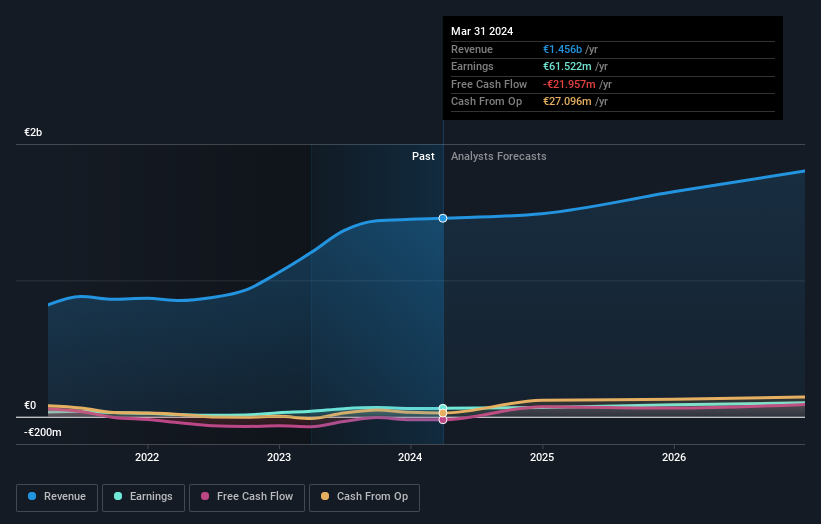Private equity firms account for 41% of Knaus Tabbert AG's (ETR:KTA) ownership, while private companies account for 25%
Key Insights
Knaus Tabbert's significant private equity firms ownership suggests that the key decisions are influenced by shareholders from the larger public
A total of 2 investors have a majority stake in the company with 66% ownership
If you want to know who really controls Knaus Tabbert AG (ETR:KTA), then you'll have to look at the makeup of its share registry. The group holding the most number of shares in the company, around 41% to be precise, is private equity firms. In other words, the group stands to gain the most (or lose the most) from their investment into the company.
Private companies, on the other hand, account for 25% of the company's stockholders.
In the chart below, we zoom in on the different ownership groups of Knaus Tabbert.
Check out our latest analysis for Knaus Tabbert
What Does The Institutional Ownership Tell Us About Knaus Tabbert?
Institutional investors commonly compare their own returns to the returns of a commonly followed index. So they generally do consider buying larger companies that are included in the relevant benchmark index.
We can see that Knaus Tabbert does have institutional investors; and they hold a good portion of the company's stock. This suggests some credibility amongst professional investors. But we can't rely on that fact alone since institutions make bad investments sometimes, just like everyone does. It is not uncommon to see a big share price drop if two large institutional investors try to sell out of a stock at the same time. So it is worth checking the past earnings trajectory of Knaus Tabbert, (below). Of course, keep in mind that there are other factors to consider, too.
Hedge funds don't have many shares in Knaus Tabbert. HTP Investments B.V. is currently the company's largest shareholder with 41% of shares outstanding. With 25% and 3.0% of the shares outstanding respectively, Catalina Capital Partners B.V. and Allianz Asset Management GmbH are the second and third largest shareholders.
To make our study more interesting, we found that the top 2 shareholders have a majority ownership in the company, meaning that they are powerful enough to influence the decisions of the company.
Researching institutional ownership is a good way to gauge and filter a stock's expected performance. The same can be achieved by studying analyst sentiments. There are plenty of analysts covering the stock, so it might be worth seeing what they are forecasting, too.
Insider Ownership Of Knaus Tabbert
The definition of company insiders can be subjective and does vary between jurisdictions. Our data reflects individual insiders, capturing board members at the very least. Management ultimately answers to the board. However, it is not uncommon for managers to be executive board members, especially if they are a founder or the CEO.
Most consider insider ownership a positive because it can indicate the board is well aligned with other shareholders. However, on some occasions too much power is concentrated within this group.
We note our data does not show any board members holding shares, personally. Not all jurisdictions have the same rules around disclosing insider ownership, and it is possible we have missed something, here. So you can click here learn more about the CEO.
General Public Ownership
With a 23% ownership, the general public, mostly comprising of individual investors, have some degree of sway over Knaus Tabbert. While this group can't necessarily call the shots, it can certainly have a real influence on how the company is run.
Private Equity Ownership
Private equity firms hold a 41% stake in Knaus Tabbert. This suggests they can be influential in key policy decisions. Some might like this, because private equity are sometimes activists who hold management accountable. But other times, private equity is selling out, having taking the company public.
Private Company Ownership
Our data indicates that Private Companies hold 25%, of the company's shares. It's hard to draw any conclusions from this fact alone, so its worth looking into who owns those private companies. Sometimes insiders or other related parties have an interest in shares in a public company through a separate private company.
Next Steps:
While it is well worth considering the different groups that own a company, there are other factors that are even more important. For example, we've discovered 3 warning signs for Knaus Tabbert (2 don't sit too well with us!) that you should be aware of before investing here.
If you are like me, you may want to think about whether this company will grow or shrink. Luckily, you can check this free report showing analyst forecasts for its future.
NB: Figures in this article are calculated using data from the last twelve months, which refer to the 12-month period ending on the last date of the month the financial statement is dated. This may not be consistent with full year annual report figures.
Have feedback on this article? Concerned about the content? Get in touch with us directly. Alternatively, email editorial-team (at) simplywallst.com.
This article by Simply Wall St is general in nature. We provide commentary based on historical data and analyst forecasts only using an unbiased methodology and our articles are not intended to be financial advice. It does not constitute a recommendation to buy or sell any stock, and does not take account of your objectives, or your financial situation. We aim to bring you long-term focused analysis driven by fundamental data. Note that our analysis may not factor in the latest price-sensitive company announcements or qualitative material. Simply Wall St has no position in any stocks mentioned.

 Yahoo Finance
Yahoo Finance 

